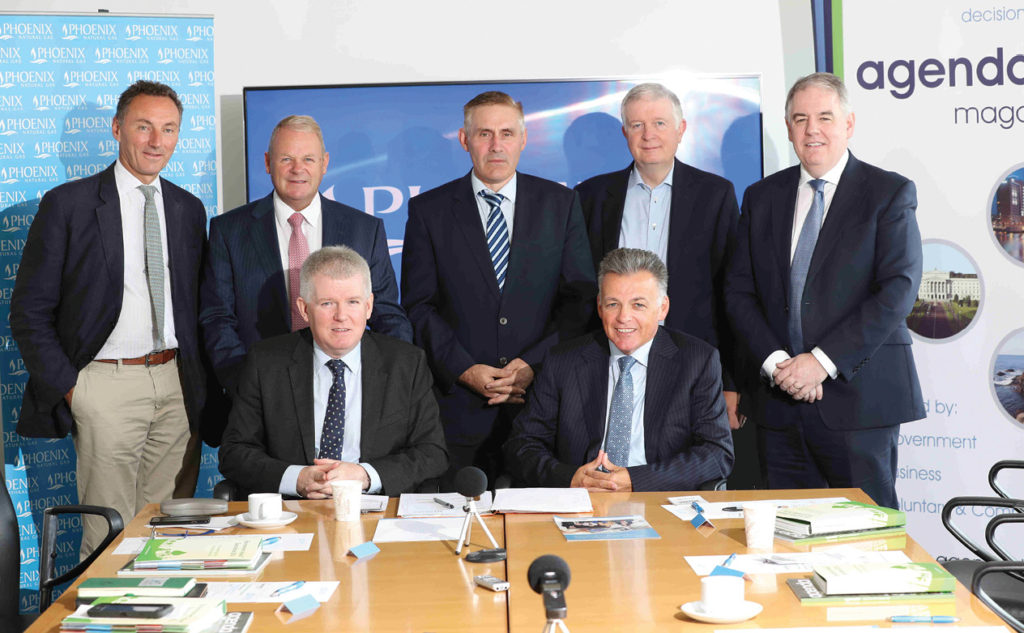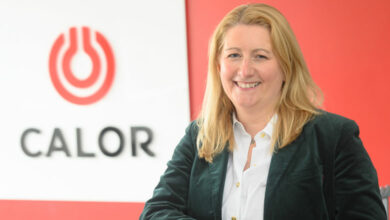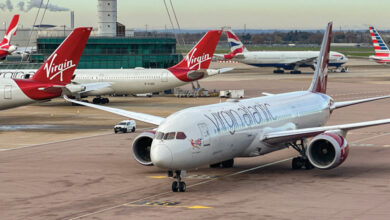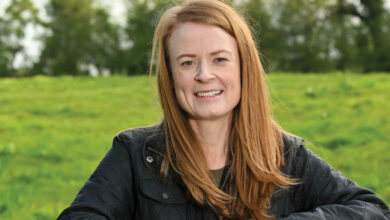Connecting people and opportunities through our infrastructure
Phoenix Natural Gas hosted a round table discussion on how investing in infrastructure, including energy networks, can play a critical role in supporting the economy and should have more of a priority in the Executive’s Programme for Government.

Does energy, and infrastructure in general, have enough of a priority in the Executive’s draft Programme for Government (PfG)?
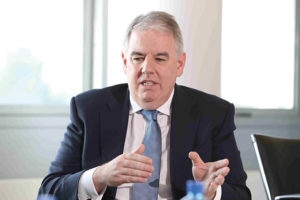
Shaun McAnee
I would take the same view as the CBI’s response to the draft PfG in that there is a ‘lack of energy’ in the PfG, particularly in light of the fact that by 2021 we will have an issue in terms of electricity supply. Some of our larger corporate customers are now moving to create their own energy supply with combined heat and power (CHP) plants and we have been supporting that. That has been driven by energy costs being too high and there appears to be no action on that issue. Costs are high and our customers, particularly in the agri-food sector, are taking action themselves. Overall, there isn’t enough focus on energy in the PfG and aren’t enough answers about the future.
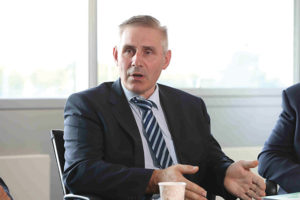
Paddy Larkin
Energy doesn’t have as much priority as it should have. Energy has a huge impact on everyone’s daily life. At one level, businesses and individuals are doing what they think best for themselves. There is no overall co-ordinated approach. The SEF [strategic energy framework] runs to 2020 but in energy terms you need a rolling 20-year plan. An example of this lack of co-ordination is seen with the north south interconnector. If that doesn’t happen that will change the picture completely. We are looking for the Executive to get behind projects like that. The large user electricity prices in Northern Ireland are out of step with the rest of Europe while our domestic prices compare favourably. There is something wrong structurally with the tariffs. Someone has to take responsibility for energy and it shouldn’t be left to individual companies to campaign on specific issues and projects. We need a rolling 20-year plan not something that falls off a cliff in 2020.
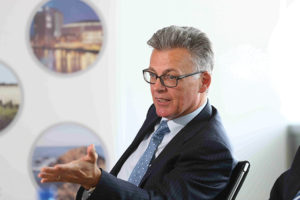
Michael McKinstry
Bearing in mind the level of both media and political attention given to the role of high electricity costs in respect to some high profile business closures in recent years coupled with the uncertainty created by policy on subsidies on renewables in the past 12 months, it was a little surprising that energy policy didn’t have a higher profile in the PfG. Whilst I do accept that the PfG is a high level strategic framework and you can see how such issues could be fitted within the general framework, I think that the issues are of such significance and clear decisions sufficiently pressing that more prominence would have been expected.
In respect to direction on wider infrastructure issues I think it would have been helpful to the broader economy and the construction industry specifically to see some stronger messages on the need for investment and perhaps some thoughts about how investment could be funded. There is the perception that there are a lot of high profile infrastructure projects underway in Great Britain, whereas in Northern Ireland, there seems to be constant news about delays in getting projects off the ground. It would be helpful to the construction sector to get some positive investment news and maybe in doing so it would help reduce somewhat the exodus on a Monday morning of skilled construction travelling to GB every week in order to earn a living.
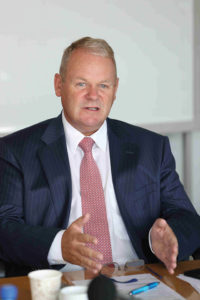
Brian Ambrose
The proof of the pudding is in the eating. When I was chairman of the CBI a decade ago one statistic I remember was Michelin flagging up that its Northern Ireland plant had the highest energy costs of their 26 plants around the world. There hasn’t been adequate progress since then. Things that we talked about on energy and infrastructure a decade ago still haven’t moved forward. There has been some progress but to make us competitive as a region the scale of progress hasn’t been adequate. We now need to take some big decisions and that is what I would be looking for and hopefully whoever is chair of CBI in 10 years will not be talking about the same things.
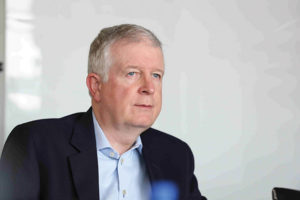
David Dobbin
The Programme for Government is more outcome focused with energy and infrastructure really inputs or enablers. I think they will get more attention in the out-workings of the PfG. There is a strategic investment plan being prepared at the moment and that should give the detail of infrastructure plans. I had the privilege of chairing an ‘Energy in Manufacturing’ group which was set up by the previous Economy Minister, Jonathan Bell, after the closure of Michelin. Among other things we looked at what could be done to try and address the dichotomy of domestic users paying a pretty competitive rate for their electricity and larger industrial users paying much higher than elsewhere. Even though we have an all-Ireland Single Electricity Market [SEM], large users in the North pay more for their electricity than their equivalents in Southern Ireland. The reason our electricity costs are higher is partially down to government policy – in the Republic of Ireland and elsewhere in Europe, governments have deliberately skewed costs in favour of large users. We put forward a number of recommendations to Government to reduce industrial electricity costs including some straight forward things such as the North South Interconnector which would improve system integrity and reduce costs.
The regulator has been overly focused on the cost of electricity to the domestic consumer. We would like to see more focus on industry. One outcome in the PfG is to make industry more competitive another is to grow the economy. Both of these outcomes, particularly in manufacturing, depend on energy. If we don’t address energy costs, we are slowly going to see larger manufacturers that are energy intensive reduce their operations here or go off grid. Perversely, I think Brexit may help. The Westminster government is now very focused on how it can improve competitiveness and grow the economy and this includes increasing spending on infrastructure and Northern Ireland could benefit from such an increase. Also some of the state aid rules that in the past have limited how government could help industry may now disappear after we leave Europe.
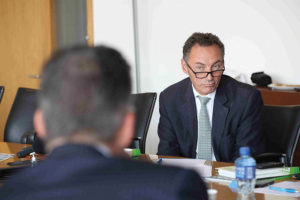
David Gavaghan
Energy and infrastructure are not given sufficient priority in the PfG. To get an objective perspective we should ask the Institution of Civil Engineers to do an evaluation of where we are. I think Northern Ireland is probably at amber if you use the traffic lights system and is heading towards red.
I would also ask, since David [Dobbin] has written his report is there any evidence of what action has been taken since?
David Dobbin
The timing of the report was unfortunate as Purdah had started and the previous minister couldn’t comment on it. We then had the election and then the appointment of a new minister and that was followed by the changes to the departments. I have had some behind the scenes talks with the Department for the Economy but so far their approach hasn’t been announced.
David Gavaghan
I think it was an excellent report but we are not in a good place on energy. There is a bigger problem with all infrastructure; have we got the capacity and capability to deliver a transformational project? The CBI’s response to the draft PfG in February noted that there is a recognition across the public sector that there is insufficient capacity. This is something that we need to move upon urgently.
David Dobbin
Some things have happened, including NIE’s latest RP6 proposals for investment in the grid. They have given the regulator a number of options to invest up to £250 million in the grid. That was a clear recommendation in the EMAG report.
David Gavaghan
One of the main participants in the energy sector has told me that they thought we are heading over a cliff in terms of our position in energy. There is a tendency at the minute for major corporates to do their own thing. This is a dog-eat-dog situation that makes things worse. Former energy regulator Douglas McIldoon has said we need a 50-year view in terms of strategy and if we truly believe we can grow our economy, and that of the whole island of Ireland, we need to be much more courageous. It is not going to be driven by the public sector; it is going to be driven by the private sector.
How can we address the energy cost issue? How do we balance the need to invest in high quality infrastructure and still have competitive energy prices?
Paddy Larkin
Cost in very important but with infrastructure, whether that is the backbone of the energy system or the roads network, there is a level you need to maintain if you want to be a developed economy. That simply means you have to invest in your networks and if you don’t make this investment you will be hit in the long-term. It is very short sighted to say that plant and equipment installed 40 years ago doesn’t need to be replaced. Even on the gas network which was built in 1996 a lot of the electronic controls are now obsolete and need replacing. Cost for me means getting the solid underlying energy infrastructure in place and then getting businesses onto the network to share the cost of the investment. The worst thing that would happen is for energy users to come off the grid. We are well behind the curve in terms of infrastructure investment in Northern Ireland. Even with Gas to the West we are only belatedly bringing gas to some of the largest energy users in the region. Companies who locate here expect a certain level of infrastructure and to have access to gas and electricity. That has to be a priority from an economic point of view. At a time when fuel costs are low, now is the time to get the infrastructure up to an adequate standard.
Shaun McAnee
Some of the best decisions are based on long-term planning. The Minister of Finance has a one-year monitoring round and a four-year capex [capital expenditure] plan but really the planning needs to be over 20 years or even 40-years.
Brian Ambrose
If I look at my day job, there are two aspects to infrastructure. The one we don’t like is investing in the invisible infrastructure. If I have to spend £10 million resurfacing the runway I have nothing to show for it. The bit you all see is if I extend the passenger terminal facilities. You have to have both.
It shouldn’t be over complicated. If you take a 30-year view, there is a certain figure we need to spend on that enabling infrastructure and that equates to X amount a year for the next 30 years. If we don’t do that, there will be a bow wave and somewhere down the line we will have to spend a lot more money.
Michael McKinstry
There will always be challenges not least our size and geographic location in keeping energy costs to a minimum but within that framework, I think there is a concern that either the absence of a clear strategy or decisions not being taken early enough we may end up paying more than we otherwise should in the short term at the least. This is particularly pertinent to the issue around electricity supply concerns around 2021. Without the north south interconnector in place we potentially may end up having to pay more in the short term than we should to deal with the potential shortfall. There needs to be the political will to make the north south interconnector happen or if it is not to happen the proper signals need to go out to find alternative solutions.
David Dobbin
One proposal from the ‘Energy in Manufacturing’ group was that there should be investment in creating a strong core grid especially for areas where there is industrial growth potential or where there is a lack of reinforcement. There is no reason whatsoever that government can’t have a 25-year plan for infrastructure, even though its expenditure is in three to five year periods.
Brian Ambrose
I agree, as long as we don’t spend five years developing a 25-year plan and don’t spend anything in the meantime.
David Dobbin
We know what needs to be done. Certainly SONI and NIE know what is required in grid development. The regulator needs to look beyond the cost of grid improvements to the long-term impact of not investing in the grid adequately. It is not just manufacturing companies that are having energy issues but also data centres and the services sector. We need an enlightened long-term plan that recognises how to optimise the potential from renewable energy. Storage is also a big opportunity where investment would allow us to maximise the use of our abundant renewable energy resources.
David Gavaghan
The biggest energy user in Northern Ireland is Northern Ireland Water. The most significant publicly owned asset is also caught with high energy costs. We already have a catch-22 situation with sewerage infrastructure in Belfast. We are at capacity and now have to spend an additional £750 million to £1 billion. Until done, this will constrain building office space in Belfast of any significance and restrain 50,000 new people being employed in the new sectors we are trying to develop. I fully accept that there is a real issue about fuel poverty and that needs to be addressed – and business should be more cognisant of this – but fundamentally overcoming energy and infrastructure constraints will be central to getting those 50,000 new jobs.
How can Northern Ireland be more attractive to investment? What are the benefits of locating here? What role will corporation tax play and how important is the availability of a skilled workforce?
Brian Ambrose
If you try and look at this region as an outsider, you have to realise that there are certain things that an investor takes as a prerequisite – they are not luxuries. They expect a good energy infrastructure and affordable energy. They expect a good road network and good direct air access. When we are discussing inward investment we need to step back and see what is a must have and what is nice to have. The more you speak to inward investors it is the skills of our workforce that is a key attraction. I quoted a statistic to an investor recently that struck a chord with them; for the month of July at the airport for the first time our sickness and absence level was zero. That says something to an investor about the calibre of the workforce we have. The other factors are not negotiable and we need a strategic hard-nosed look at what we have to offer.
Michael McKinstry
Phoenix is owned by two infrastructure funds who very much look at such an investment in the long-term as their ownership horizons are very much of that nature. They are looking for political and regulatory stability, transparency and consistency in policy and decision-making. Investments such as Phoenix are all about investing significant capital upfront and recovering such capital over the long-term. Therefore such stability and a clear track record of operating in such a manner are important principles which investors will rely upon.
There has been a lot of time devoted in Northern Ireland discussing the merits and need for corporation tax. However we should not lose sight of the other merits of investing in Northern Ireland. We need to ensure that we understand our strengths and ensure we do all things necessary to retain such selling features. We need to make the best of our high quality labour force, the quality of goods and services, the excellence of our agri-food industry, our tourism offerings, our geographic position and political connections across the world etc. Then if we then get lower corporation tax that will be a bonus.
Shaun McAnee
Corporation tax is a gamble in itself but the payoff is increased FDI [foreign direct investment]. Invest NI will tell you it moves FDI from a cost play to an income play. If we don’t have some of these infrastructure investments it limits us to a certain type of inward investment – at present that is predominantly service sector back office jobs. A lower corporation tax will get us on the same playing field as our semi-detached neighbour in the south. Increased FDI will also help keep more of our people here and stop the brain drain.
David Dobbin
The decision by Westminster to lower the national corporation tax rate to some extent reduced the benefit of lower corporation tax rate here. Reducing the rate is definitely the right direction of travel, however most of the inward investors in Belfast harbour are coming because they are getting access to good people and office space at a cost much lower than in Dublin, Edinburgh, London and Manchester. In terms of skills we need to attract world class companies here. World class companies create world class people. In the 1960s and 1970s a wave of inward investment created a generation of managers that then spilled out into the wider economy. FDI will improve the gene pool of managerial talent in Northern Ireland.
David Gavaghan
People are our key asset. Another thing any investor looks for is clarity and transparency – that is not a strength at present. A key piece of infrastructure that has transformed Europe and Britain is rail. We have to get a proper rail system going between Belfast and Dublin. Belfast will be the main beneficiary of this, as Dublin has a capacity problem that is going to take time to sort out.
Paddy Larkin
There is money in Europe to support such cross-border projects. We also don’t have the joined-up thinking that fully realises the benefits of such projects.
What one issue should the Executive focus on to ensure that the Northern Ireland economy is supported by adequate infrastructure?
David Gavaghan
There is a real problem with a lack of capability and expertise that needs to be addressed.
David Dobbin
In terms of the economy and energy they need to have a set of clear policies and strategies in place and then the implementation of these is key. A lot of the aspirations in the PfG are fantastic but it is making it happen that is crucial. We really need to now move into delivery mode.
Brian Ambrose
Within six months they should have an infrastructure plan for the next 30 years and then decide how to fund it and then commit to do it. We are not looking for five years of work or a huge document but a 30-year plan with the annual spend and a commitment to delivering that.
Michael McKinstry
There is a perception rightly or wrongly that decisions are a long time in the making. I think in this new political landscape with potentially a reasonable timeframe before the next set of elections, there is an opportunity to develop a more effective decision-making process and provide clear direction as to where we are going. We also need to see more joined-up thinking between departments – issues around tendering infrastructure projects and the planning process have contributed to delays in making things happen, which can delay and sometimes prevent good projects getting off the ground. However should not lose sight of one of our biggest selling features as an economy, our highly skilled workforce. We need to resolve some of the issues of funding across our schools and universities – we also need to ensure that the types of skills we are developing continue to be those needed to drive our economy.
Paddy Larkin
A long-term plan for core infrastructure that is a 40-year commitment on how to meet our core infrastructure investments. We might make a mistake or two but we have to get on with it or it will certainly cost us much more in the longer term. It is also important to look at how risk will be allocated between consumers and developers.
Shaun McAnee
A long-term plan with adequate stakeholder engagement to outline a number of transformational flagship projects. We also need to be collectively agile to deliver these projects.
Participants

Brian Ambrose
Brain Ambrose is Chief Executive, George Best Belfast City Airport. A career spanning 40 years in the Aviation Industry included 25 years with Bombardier before moving to the Airport. Brian is currently, Chairman of Mencap Northern Ireland; Chairman of Tourism Ireland; Non-Executive Director Phoenix Natural Gas; a Trustee of the Titanic Foundation and a Board Member of Business in the Community. He was awarded an OBE in the New Year’s Honours in 2011.
 David Dobbin
David Dobbin
David Dobbin is the Chairman of Belfast Harbour and recently retired as CEO of Dale Farm. He is also Chairman of the UK dairy trade association, Dairy UK; a member of the Northern Ireland Food Strategy Board and was appointed as an expert to the EU Agri Markets Task Force earlier this year. A passionate rugby enthusiast, David is Chairman of Ulster Rugby and has previously held the chairmanships of the Strategic Investment Board, InterTradeIreland and CBI Northern Ireland.
 David Gavaghan
David Gavaghan
David Gavaghan is Chair of CBI Northern Ireland from 2016-2018, having previously been Vice Chair. David has established Aurora Prime Real Estate Limited and is seeking to raise £50 million locally and internationally to invest in Grade A office space in Belfast. Previously he was Executive Director of Quintain Estates and Development plc. He is the former Chief Executive of Titanic Quarter Limited and prior to that was Chief Executive of the Strategic Investment Board Limited for six years.
 Paddy Larkin
Paddy Larkin
Paddy Larkin was appointed Chief Executive of Mutual Energy in January 2010. Previously Paddy was Chief Executive Officer of Premier Power Ltd, which operates Ballylumford Power Station and before that worked with NIE. Mutual Energy, together with SGN, have been awarded the licences to build and operate the high and low pressure gas network to bring Gas to the West – a project valued at around £250 million.
 Shaun McAnee
Shaun McAnee
Shaun McAnee is Managing Director of Corporate Banking at Danske Bank. He has responsibility for leading Danske’s Corporate Banking, Markets, Specialist Business and Agri-Business teams, as well as the bank’s regional Finance Centres throughout Northern Ireland. He joined Danske Bank in 2012, having previously held a number of senior positions in the banking and financial sector across the UK and Ireland. Shaun is a council member of the CBI NI Council.
 Michael McKinstry
Michael McKinstry
Michael McKinstry has been CEO of Phoenix Energy Holdings since September 2014. He joined the company in 1996 as Finance Director and took up a position on the Group Board in January 2006 following the acquisition of Phoenix by Terra Firma. Prior to joining Phoenix, Michael gained extensive financial management experience across a broad range of business sectors including GEC, Ulster Weavers and Premier Power following its purchase by British Gas.

